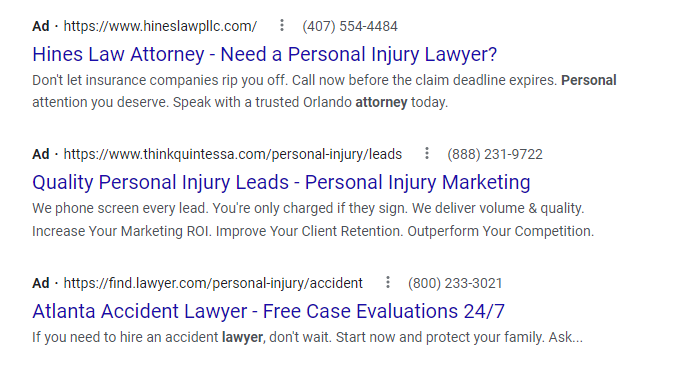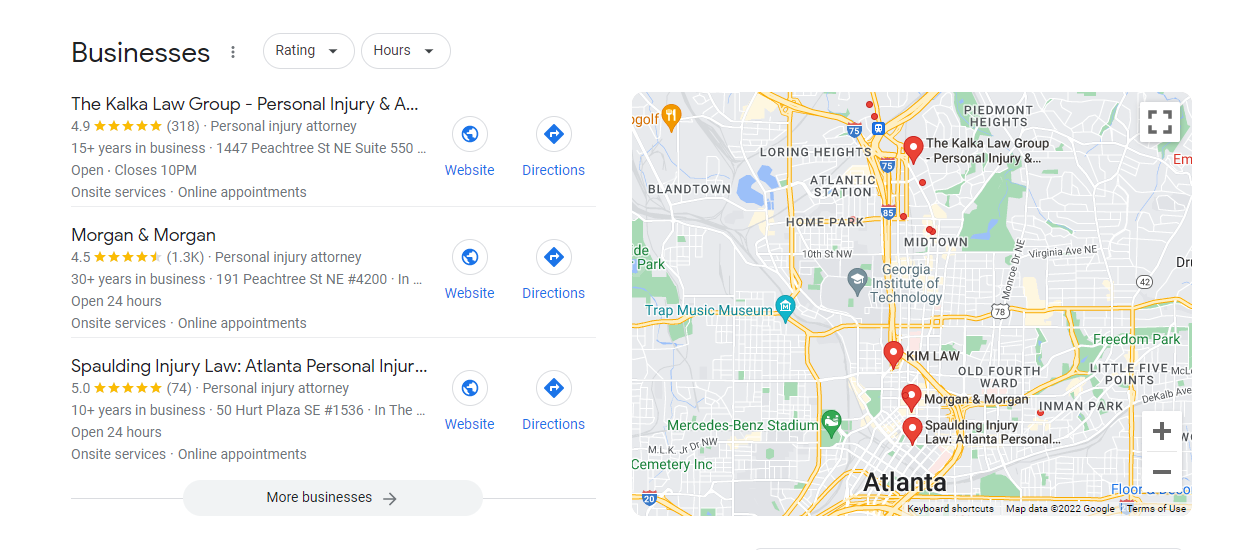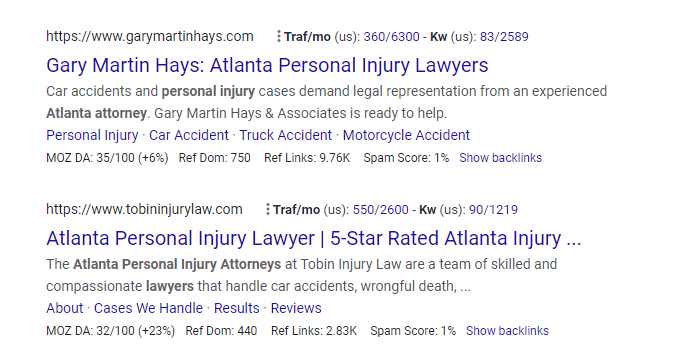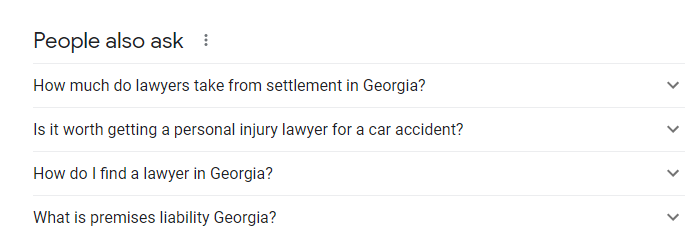
Law Firm Marketing
Discover tips on implementing marketing automation to streamline client communication, nurture leads, and boost your personal injury practice.
Law Firm MarketingAugust 29, 2022
While there are many marketing channels that law firms can choose, SEO remains one of the most effective ways for firms to increase visibility and attract quality clients. Since search engines are the main way that prospective clients will research law firms, focusing on SEO is a crucial part of any law firm's marketing strategy.
Law firm search engine optimization (SEO) is the ongoing process of optimizing or improving the visibility of your website on search engines. This process includes improving the quality of content, backlinks, and traffic coming to your law firm's website. The ultimate goal of law firm SEO is to obtain top search engine rankings when someone searches for your services.
SEO is important because according to a 2015 study, 96% of people seeking legal advice used a search engine to find a lawyer or legal information.
Law firm SEO provides several opportunities to grow your firm's visibility and to bring in more prospective clients. With high-quality content and well-researched keywords, your firm will show up in more searches and rank higher in the search engine results, which will drive more qualified traffic to your website.
A proper SEO strategy will allow your firm to build backlinks naturally without paid ads or extensive outreach, which will help build your reputation and credibility. In turn, this will also help your law firm's website rank even higher in search engine results.
With thoughtful, valuable content, you can establish yourself as an authority and thought leader in your firm's practice area(s), which will convert blog readers and website visitors into clients at a higher rate.
Law firm SEO deserves some of your marketing focus because of all the marketing channels available, SEO provides the highest return on investment.
SEO comprises valuable, keyword-rich content, backlinks, and tags to let search engines know what your content or website is offering. There are several components that make up a strong SEO strategy:
When done correctly, SEO outperforms other marketing channels in bringing in prospective clients, including social media and paid advertising.
Google’s Search Engine Results Page (SERP) refers to what shows up on the page when someone performs a search on Google.
Local Service Ads (LSA): LSAs display above everything else in Google’s search results and operate on a Pay Per Lead (PPL) basis. This means that you pay each time someone clicks on your ad and fills out a form, to become a lead for your firm.

Google Search Ads: Search Ads display below LSAs and above the Local Search Results. The ads operate on a Pay-Per-Click (PPC) basis. This means that you are paying each time someone clicks on these ads.

Local Search Results: The Local Search Results are an extension of Google Maps. It is configured through a Google Business Profile. This is a free profile that you set up for your firm, that shows up when people are looking for law firms in their area. Since this is a free profile, competition is steep, and grabbing this spot on Google search results can be tough, but with the right law firm SEO strategy it is possible.

Organic Search Results: The Organic SEO Results show up below the Local Search Results. These are the results that show up without paying for ads and is the area most commonly associated with Google search results.

People Also Ask: This is a list of questions related to the searcher’s initial question. It displays within Google’s search results. It usually appears directly below the top relevant organic result.

Featured Snippets: Google's Featured Snippets, (also called Position 0 in search results), will show up in Google search results for question-based searches or when structured data (such as tables of information) are present in the content.

The basic principle of law firm SEO marketing, specifically on Google has remained the same for many years:
Google fiercely protects its search results and updates its algorithms for the best accuracy for searchers. It continues to assess each website for a large variety of factors, called the Google ranking factors.
Any reputable agency providing professional SEO services stays on top of Google’s algorithms.
Google wants to return the most accurate, credible and authoritative information to its users.
The following factors most impact a website’s search engine rankings in Google’s search results:
Content refers to all written or video content on your firm's website. This content should be original, valuable, and captivating for the reader. The truth is that content is the cornerstone of any strong, successful marketing strategy. All content should be relevant, optimized for law keywords, valuable, and easy to scan, read, and share.
Top Types of Content for Law Firms:
Content, whether it is blog articles, website pages, videos, or podcasts, is one of the most effective law firm digital marketing techniques to invest time, energy, and money in.
By consistently publishing informative, valuable content, your firm will become a subject matter expert to potential clients. It increases your website rankings on search engines, your website traffic, and visitors from social media, which will ultimately contribute to increased leads from prospective clients.
An optimized and successful piece of content for your law firm should be comprehensive, easily digestible for the reader, and scannable.
When creating content for your law firm, it is vital to note that Google favors content that’s written by industry experts and is authoritative.
Google has an abbreviation for this type of content: E-A-T. That stands for Expertise, Authoritativeness, and Trustworthiness
Backlinks (or just links for short), are used to calculate a web page’s “PageRank.” A simplified definition of PageRank is below.
PageRank is an algorithm used by Google to evaluate the perceived value of a web page.
Think about all of the content that’s online. Now, consider how Google decides what content to show for given search results. There are thousands of articles and blog posts covering the same topic, so backlinks are one way that Google helps determine what content should be on the first page of search results.
While the importance of links has changed over time, quality links do continue to play a lead role in determining a website’s position in Google’s search results.
Every credible, relevant, authoritative link that points to your website is seen as a digital vote of confidence and helps your website rank better in search results.
While technical SEO might seem daunting, it is an important area of focus for your overall SEO strategy. If it is not done correctly, it can harm any other SEO efforts you make for your firm.
The easiest way to think about technical SEO is that it is the way that Google measures how search engine-friendly your law firm’s website is.
Technical SEO for your law firm will examine your URL structure, sitemaps, security, and website code.
Here is an overview of the technical SEO areas to be mindful of:
Google’s algorithms are mobile-first since most internet traffic is from a mobile device. That means Google looks at the mobile version of your website, first, when indexing your pages.
In order to get a good ranking, you will want to prioritize the mobile version of your website. That means you need to ensure it’s responsive on all screen sizes, including tablets, desktops, and mobile devices.
Along with being mobile-first, all website pages should load in under 2.5 seconds. Any longer than that, and it’ll affect your rankings.
Craft your website with the end-user experience in mind. Google sends a robot to crawl every website online. It’s how they discover new websites and get the data necessary to index them, determining their placements on the Search Engine Results Pages.
If your website is user-friendly and has logical navigation and structure, that robot (and your website visitors) are more likely to find your website, navigate through it, and understand what they’re about.
Google provides some general guidelines for what your website should be doing to get the best ranking in search results. Go through their Webmaster Guidelines for technical SEO tips, to ensure you're following best practices for law firm websites to get the best results.
Page-level optimization is one of Google's main Ranking Factors (this is also called onsite optimization).
This refers to how well the text, images, and videos on each webpage are optimized for search.
It’s an expansive list of action items you can do to ensure the best ranking for each of your website pages. If you would like an extensive list of what you can do for on-page optimization, Backlinko provides an extensive checklist.
Keyword research is the foundation of your search engine marketing strategy. It is important to note that keyword research should come before content creation or writing. In most cases, you will waste time, energy, and money without proper keyword research to guide your content.
Keyword research is the process of discovering the terms and searches that prospective clients are using in Google’s search engine to find out more about your services and areas of practice.
Each search contains keywords that show specific intent. That means that the person searching has a basic idea of what they are looking for, based on the words they put into the search engine.
For instance, the search, “best personal injury attorney in Dallas” implies the user is searching for a top attorney to support them with an injury.
As you begin putting your SEO strategy together you will want to determine where in Google you show up now and where you would like your firm to show up. You will want to begin with researching keywords that focus on what your potential clients would be searching for, tackling your technical SEO, and creating a robust, targeted content calendar, filled with valuable, thoughtful, keyword-rich content.
There are many elements to consider when looking at SEO for your firm. This article offers a solid foundation to get you started on your way to getting the best Search Engine Rankings possible for your law firm.
SHARE
